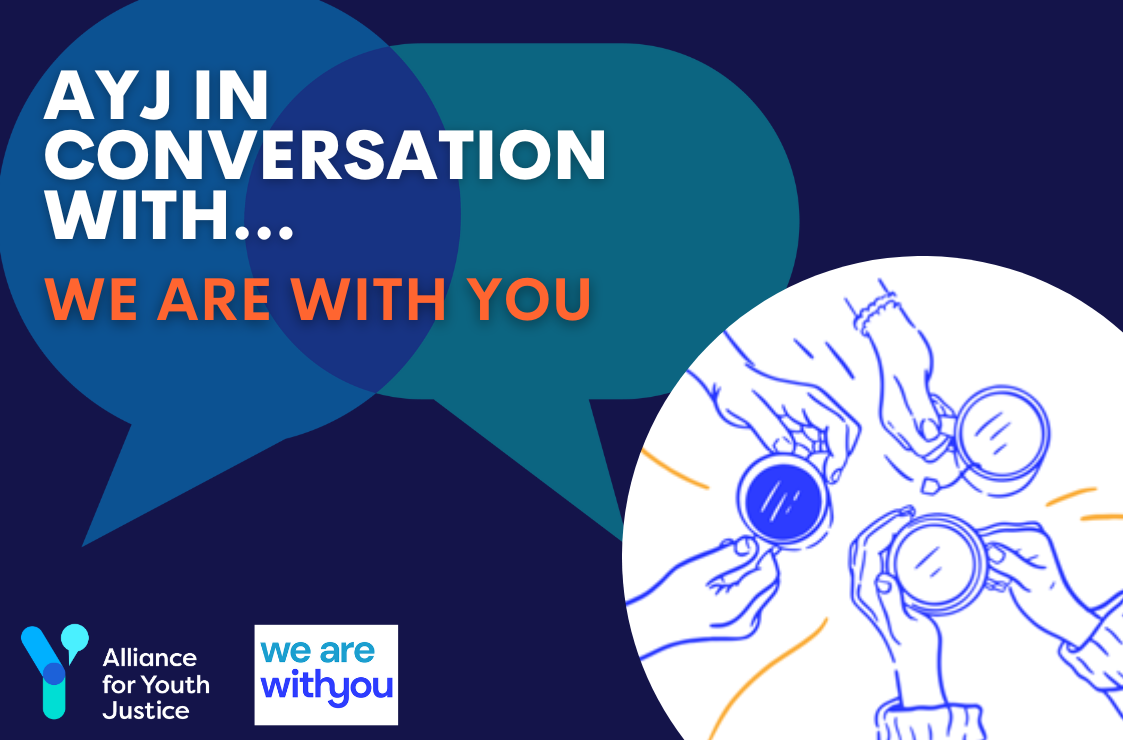AYJ In Conversation with We Are With You
AYJ member We Are With You is a charity providing free, confidential support to people experiencing issues with drugs, alcohol or mental health.
We speak with Agnes Wootton, Re-Frame Service Manager at With You, about the importance of the programme for vulnerable children in contact with the justice system, and the research behind it.
Tell us a bit about yourself, and the work that We Are With You conduct with children and young people.
We Are With You (or ‘With You’ for short) has services where we provide support to children and young people across England and Scotland surrounding their mental health and drug and alcohol use.
I have worked in the young persons’ drug and alcohol sector for the last 11 years, in a variety of roles. Currently I manage Re-Frame, a multi-site diversion programme for young people (Cornwall, Wigan, Sefton and Kent).
You oversee a project called Re-Frame, in which you work to divert children from the criminal justice system. Why do you think that this is an important area of focus?
The criminalisation of children and young people is not helpful for the individual or society. It’s costly, and often worsens the situation for some of our most vulnerable young people, isolating them further from support and positive influences. We need to approach policing from a child-centred perspective, when children are viewed and treated as children - and potentially victims - before they are seen as perpetrators.
“The criminalisation of children and young people is not helpful for the individual or society. It’s costly, and often worsens the situation for some of our most vulnerable young people, isolating them further from support and positive influences. ”
We also work to tackle disproportionality. We know that many more young Black people are likely to be stopped and searched and also given potentially more punitive outcomes than White people. We are hoping to challenge this and provide more support and equality for racially minoritised children in contact with the justice system too.
Could you tell us about the service, and how it works?
We support children aged 10-17 who are caught in possession of a Class B or C substance (mainly cannabis).
The police refer a child to us that is eligible for an Outcome 22 (when prosecution is delayed until the person being accused has been given the chance to engage with an intervention), or diversion. Every area works slightly differently: officers in some areas refer children to us directly, whereas others have a multi-agency panel – which we attend – where the case is discussed before referral. We then offer the young person education and support, exploring the reason for their substance abuse in more detail.
We are funded by the Youth Endowment Fund, who are keen to find out what works in reducing youth violence. We have been partnered with the University of Kent who are evaluating our work using a Randomised Control Trial (RCT) with participants of our programme. This is really important, because there is currently a lack of robust evidence in the UK about what makes diversion effective, and for whom.
The children who consent to taking part in the RCT are put into one of two groups: 1) the control group, for whom we provide a harm reduction session, a brief information and advice session, and us responding to immediate safeguarding concerns, or 2) the intervention group, who receive two, hour-long appointments using restorative methods to explore the impact of their actions, providing drug and alcohol education and holistic support tailored to their individual needs. We can then collect evidence and make comparisons about how effective treatments are.
We have very high attendance rates to date, with over 90% of young people attending sessions. We are currently in our second year of this three-year project. In the first six-month pilot, we reached over 110 children, with 76 of these taking part in the randomised trial. At the next milestone, we hope to have supported 400 children.
The pilot report is due to be published in the spring – so keep your eyes peeled! A final report summing up the study will be out in the summer of 2024.
What range of experiences have the children with whom you work had that have led them to the service?
The children often have very complex needs, such mental health difficulties, isolation, difficult family relationships, special educational needs and experience of poverty. Children we work with often are at risk of criminal exploitation, with some already being involved in county lines and/ or drug dealing.
“The children often have very complex needs, such mental health difficulties, isolation, difficult family relationships, special educational needs and experience of poverty. Children we work with often are at risk of criminal exploitation, with some already being involved in county lines and/ or drug dealing. ”
The majority of children that we work with are white males. We aren’t sure why, but have requested local datasets on charging and stop and search to see understand this disparity.
What do you hope that that the outcomes of the project will be, and what could its implications be for the wider sector?
We’d like to develop the evidence base that’s already out there, such as the Centre for Justice Innovation’s fantastic recent research on young people’s voices on youth diversion. We want to know who diversion works for, and why. We hope to highlight good practice, and that project findings will show how much more effective, and less expensive, a diversion scheme is for children than criminalising them!
If the evidence shows this, then I hope that funding will be available to deliver the Re-Frame programme in other areas where such diversion options are not already provided. At the moment, there is a postcode lottery for vulnerable children in terms of what support they get.





